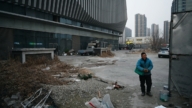【新唐人2011年11月11日讯】去年2月,上海证大房地产有限公司以创记录的价格购买了上海外滩一块地块,而成为上海地王。最近,证大只保留这处地产35%的股权,将控股权转移给一家关联公司。据中国指数研究院统计,10月全中国土地成交同比跌四成,9热点城市没卖掉一块住宅地。学者认为,中国房地产一直处于畸形状态,现在资金链断裂向下调控不可避免,但对民生有利,对经济回归正常状态也有利。
上海证大房地产有限公司董事长在上周表示,同意让其他人插手外滩国际金融服务中心8-1地块,因政府收紧信贷市场,证大正面临着财务压力。
去年这笔地产交易标价95.7亿元,而且总价还包括了手续费和贷款估值,目前这笔交易似乎没有出现估值大幅上升或大幅下降。
但据中国指数研究院发布的资料显示,10月深圳、苏州等6个热点城市没有住宅用地推出,广州、成都等9个热点城市住宅用地零成交;10月全中国133个城市共成交土地1365宗,成交面积5500万平方米,环比减少40%,同比减少37%。
另外,道钟斯通讯社(Dow Jones Newswires)计算,10月份住宅销售面积较上年同期也下滑了11.6%。
对此,著名学者、中国财经独立评论家巩胜利表示,中共政权管控房地产不是用市场手段,而是用临时的行政措施,这在欧美法治国家是行不通的,这就导致了中国房地产畸形发展。房地产回档是很自然的现象。
巩胜利:“因为2011年中国房地产达到了62年来的最高峰,就是售价也好、房地产产出也好,还有老百姓买房也好,都达到了价格的最高峰。房地产达到这么高的水准,很奇怪的现象。回档这说明中国房地产在寻求一个正常的环境在往回档,这个环境我估计要持续两到三年时间吧,才能回归正常。”
《华尔街日报》指出,中国房地产价格下降的势头越来越明显,表明北京调控房价的政策已经初见成效。
巩胜利认为,房地产下调不是政府调控的结果,因为温家宝压了房地产很多年都没有达到目标,现在货币一收就有效。卖房的、卖土地的、没有钱的就收缩,盖好了的房子卖不出去,只有降低房价。巩胜利指出,目前的房地产下调只是初步阶段,下调的深层可能要到明年的中期,或下期。
巩胜利:“政府投资要减少,这是一个方面;还有房地产当中的资本也在缺少,比如中国出现温州的老板走掉,还有内蒙古的鄂尔多斯、还有广东省的东莞,都出现资金链的断接。资本链断接,没有这么多进入房地产市场,房地产自然而然就开始下调。”
《华尔街日报》认为,房地产市场是中国经济增长的一个重要驱动力量,房地产下滑,将威胁中国经济增长。
而巩胜利指出,中国把房地产作为最领头的产业本身就不正常,像欧美没有哪个国家把房地产作为支柱企业,但房地产降温能让中国经济处于正常状态下发展。巩胜利还认为,房地产正常应该下调20%至30%左右,这对民生是好事,让老百姓买得起房才是一个国家稳定的大局,这是必须要走的路,不然房地产企业将来倒闭的更多。
巩胜利:“杭州、南京还有一些城市,他们政府获得的利润占了政府的50%以上,有很多城市都是这样的。如果长期靠房地产运行,不管哪个国家,哪有那么多土地供你买卖呢?房地产下调,可能会使中国经济回归正常状态。”
最近几个星期里,中国几家最大的房地产开发商纷纷在上海、北京及深圳等大城市降价促销,而这波降价风潮也已蔓延到杭州、合肥等二三线城市。中国社会科学院工业经济研究所投资与市场研究室主任曹建海认为,如果政府继续实行调控措施的话,那么房价将下跌50%。
新唐人记者秦雪、宋风、郭敬采访报导。
Tumultuous Times for China’s Real Estate Market
Last February, Shanghai Zendai Real Estate Limited
paid a record price for land in Shanghai Bund,
a waterfront area and one of the most famous tourist
destinations in Shanghai.
Zendai owns only 35% of the shares of the property,
and will be transfer most shares to a controlling affiliate.
According to the China Index Research Institute of Statistics,
in October, land transaction in China dropped 40% compared to one year ago.
No urban residential land was sold in nine hot cities.
Scholars believe that China’s real estate,
which has been in a deformed state,
now the fund chain break regulates inevitably downward.
This will benefit society and help bring the economy back to normal.
The president of Shanghai Zendai Real Estate Company
said last week that he agreed to sell Lot 8-1
at Bund International Financial Services Centre.
As the Chinese Communist Party (CCP) tightens credit
markets, Zendai is facing a lot of financial pressure.
The price of this Shanghai Zendai real estate transaction
was listed at RMB 9.57 billion [US$1.5 billion].
Currently, the valuation has not significantly increased
nor decreased.
According to data released by the China Index Research
Institute, in October, 15 hot cities including Shenzhen,
Suzhou, Guangzhou and Chengdu, no any transaction record
was found for residential land sales.
In October, in 133 cities throughout China, there were only
1,365 residential land sales recorded,
totaling 55 million square meters [13.6 million acres],
or a decrease of 40% in link relative ratio, down 37% on a year-on-year basis.
In addition, according to the Dow Jones Newswire’s
calculations, residential properties sale in October fell 11.6% compared to one year ago.
Gong Shengli, a well-known scholar and independent critic,
said the Communist Chinese Regime control real estate is not with the market method,
but a temporary administrative measure,
which does not work in Europe and North America.
This has led to China’s abnormal real estate development.
Actually, real estate market corrections are normal.
Gong Shengli: “China’s current real estate list prices,
real estate outputs, and purchasing prices are the highest they’ve been in 62 years.
It is very strange that real estate has skyrocketed like it has.
Real estate correction indicators show that the market
is headed for a correction,
which I estimate would happen in two to three years."
The Wall Street Journal pointed out that the momentum of
China’s falling real estate prices is more and more obvious,
which shows that Beijing’s price regulation policies
have achieved some initial success.
Gong Shengli believes that the real estate downturn is not
the result of government regulations,
as Wen Jiabao has been trying to exert pressure on the real
estate market for many years, with no success.
However, true changes in the real estate market
occurred immediately once cash flow is tightened.
Home and landowners dropped their prices
when they saw that people are strapped for cash.
Once a new home is built and is not selling,
the owner will be forced to lower his asking price.
Gong Shengli said the current real estate downturn is only
a preliminary stage, and that deep cuts may occur during next year’s mid-term or late term.
Gong Shengli: “Government investment has declined,
this is one aspect; there is also a lack of real estate capital.
For example, a boss in Wenzhou reneged on a big loan and
escaped, and other cities have also broken capital chains,
(a cycle of capital flows), including Erdos, Inner Mongolia,
and Dongguan in Guangdong Province.
If a capital chain is broken, then less capital will flow
into the real estate market, thus the market will naturally taper off."
The Wall Street Journal said the real estate market is
an important driving force behind China’s economic growth.
Thus, a real estate downturn will threaten
China’s economic growth.
Gong Shengli said, It’s abnormal for any country, including
China, to place the real estate industry in such a leading role.
Neither the United States nor Europe
has relied on real estate as an economic pillar.
The fact that real estate is cooling down in China
could help the Chinese economy develop at a normal rate.
Gong also believes that real estate prices need to drop
a further 20% to 30%, which will be good for society,
as people will be able to afford housing, which is good
for a country’s stability.
It’s the way we have to go, or else many more real estate
businesses will close in the future.
Gong Shengli, “There are a number of cities in Hangzhou
and Nanjing, whose revenues accounted for 50% of the government’s income.
Many cities are like this.
If we rely on real estate to this degree, in any country,
how could there be so much land to trade?
A real estate downturn will help bring China’s economy
back to normal."
In recent weeks, China’s largest real estate developers have
marked down their prices in Shanghai, Beijing and Shenzhen, among others.
This trend has begun to spread to second and third tier cities
such as Hangzhou and Hefei.
Director Cao Jianhai, an investment and market research
analyst at the Institute of Industrial Economics of CASS,
said that if the CCP continues to implement control measures,
house prices would inevitably fall by 50%.
NTD reporters Qin Xue, Song Feng and Guo Jing





























